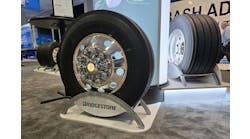After attending HDAW and HD Aftermarket Dialogue a few weeks ago, it is apparent to all that the industry is changing rapidly. Not just the new electronic controls and advanced systems, new engines, auto-shift transmissions, etc. That list, by the way always seems to expand as we move forward.
There are fundamental changes that have taken place with trucks over the past several years, in a very deliberate manner and all moving toward greater fuel economy, lower emissions, better vehicle safety and driver improvement.
If it sometimes seems like our industry is under assault by government agencies. That is not too far from the truth. Many of our federal agencies’ staffers do not understand why we need trucks and view them as dirty and inefficient. None of that is true, of course.
Our trucking and related logistics industries in the U.S. are a model for the rest of the world, in terms of efficiency, safety, environmental matters and more. Much of what we see is being driven by legislation and resulting regulations. But, all of these changes do result in cost savings for the truck operator and benefits all of us with a better and safer environment, as well as a healthier truck fleet.
My question on all of that is the whole chicken vs. egg thing. Ours is a hyper-cost-conscious industry and we would be doing most of what we do today with or without the insistence of government agencies, but I digress.
Parts and Service Industry Challenges
With all of these improvements and the extended life of vehicles, the challenges facing the parts and service industry are also moving forward and do not seem to slow down or stop.
The first owner of a heavy truck has typically kept the vehicle for two-and-a-half or three years until the warranty runs out. They do not have the time or budget to spend on repairs and parts replacement. The truckload industry and much of LTL industry is too price competitive to run any other way.
The second owner of the truck does a fair amount of parts and service spending on the vehicle, but usually well below the total outlay for a new truck – less than half in some cases. This cost keeps them competitive with the first-owner fleets, but it is also the “sweet spot” market for the independent channel.
Many second owners tend to look to the independent market for repairs, due to cost, available service and the range of jobs they are willing to tackle.
Repair Information
The greater complexity in the newer vehicles, particularly the 2007 and newer models, are creating a problem for many repair technicians. Availability of diagnostic equipment, data or software seems to be a common complaint because, I am told, these things are “impossible” for an independent shop to get.
Difficult or hard to find, maybe, but not impossible. Companies making heavy duty trucks offer diagnostic tools and training to use them on their websites. One needs to know where to look for this. As my wife always says to me when I have a question: “Did you Google it?”
The European model seems to be working its way here. In Europe, the repair information and diagnostics are readily available to individuals trained and qualified to perform engine or drivetrain service.
I do not know all of the details on this, but from what we are told, there is no conspiracy to withhold this information from the independents.
Much is being said about a new law passed in Massachusetts last year that dealt with the repair information issue for both light and heavy vehicles. This new law makes it so that the owner of the vehicle is also the owner of the data in it, diagnostic or otherwise.
In speaking with a senior person from a major truck manufacturer, I was told the OEMs really never viewed it any other way, even prior to the law. Their primary customer is the truck owner, and good luck telling a customer where or how they can buy things like parts and service.
Groups on the Forefront
Several entities are currently involved in this issue for the independent and fleet elements of the market. Technology & Maintenance Council (www.trucking.org/Technology_Council.aspx), as always, is out front with its task forces and study groups on the “right to repair” issue.
A light vehicle group, National Automotive Service Task Force (www.nastf.org). It is currently working on improving its coverage on heavy duty trucks and the whole right to repair issue. They need supporting members to help guide them forward.
Other groups are working on the issue on behalf of the independents, but these two have the track record, the infrastructure and the problem-solving skills to make a difference on this topic.
Both have participation from the range of affected elements of the issue, the vehicle owners, repair shops, suppliers, consultants and equipment manufacturers. In an open forum they both discuss the availability of information, complaints from owners and users. Their primary mission is to work on problem resolution, rather than border wars.
The whole idea is to keep trucks on the road. If there are two sides on that issue, which there shouldn’t be, both need to work together to resolve the issues.
I hope you see the need to get involved. That is my intention with this column.
Organizations like the previously mentioned have little to gain from solving this issue. The loss of the initiative to work as an industry on the problem, however, could be traumatic for the independent channel of our market.




